From May 20th to May 21st, 2023 Tsinghua PBCSF Global Finance Forum “Bolstering Confidence, High-Quality Financial Development Promoting a Chinese Path to Modernization” has successfully held in Beijing, attracting high attention from all walks of life. As one of the key issues in the finance forum, in Plenary Session VIII “Global Zero-Carbon Financial Governance and Financial Openness”, experts and scholars from home and abroad gathered and joined discussion on the future of the world, which brought a wonderful collision of thinking to the participants.
In Plenary Session VIII “Global Zero-Carbon Financial Governance and Financial Openness”, Zhu Min, former Deputy Managing Director of International Monetary Fund and former Deputy Governor of People's Bank of China, made an opening speech focusing on tremendous changes from zero-carbon to the global governance mechanism and financial industry. Wang Xin, Director of the Research Bureau of the People's Bank of China, Erik Berglof, Chief Economist of the Asian Infrastructure Investment Bank (AIIB), Chen Weidong, chairman of Bank of China Research Institute, Zhang Liqing, Director of the International Finance Research Center at the Central University of Finance and Economics, gave speeches about sustainable international finance cooperation, financial regulation and opening-up, green energy transformation, and financial opening-up expansion in China, respectively. Zhang Xiaoyan moderated the session.
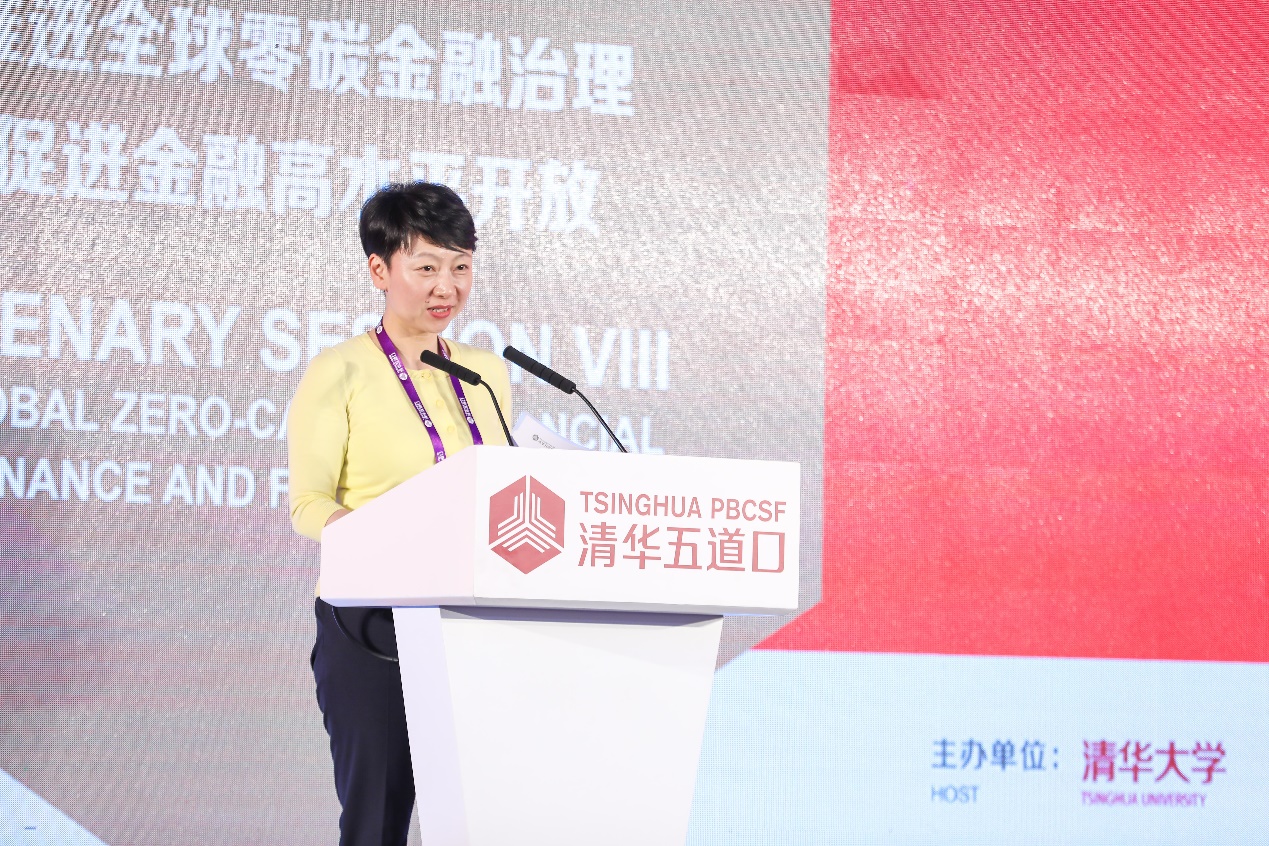
Moderator Zhang Xiaoyan
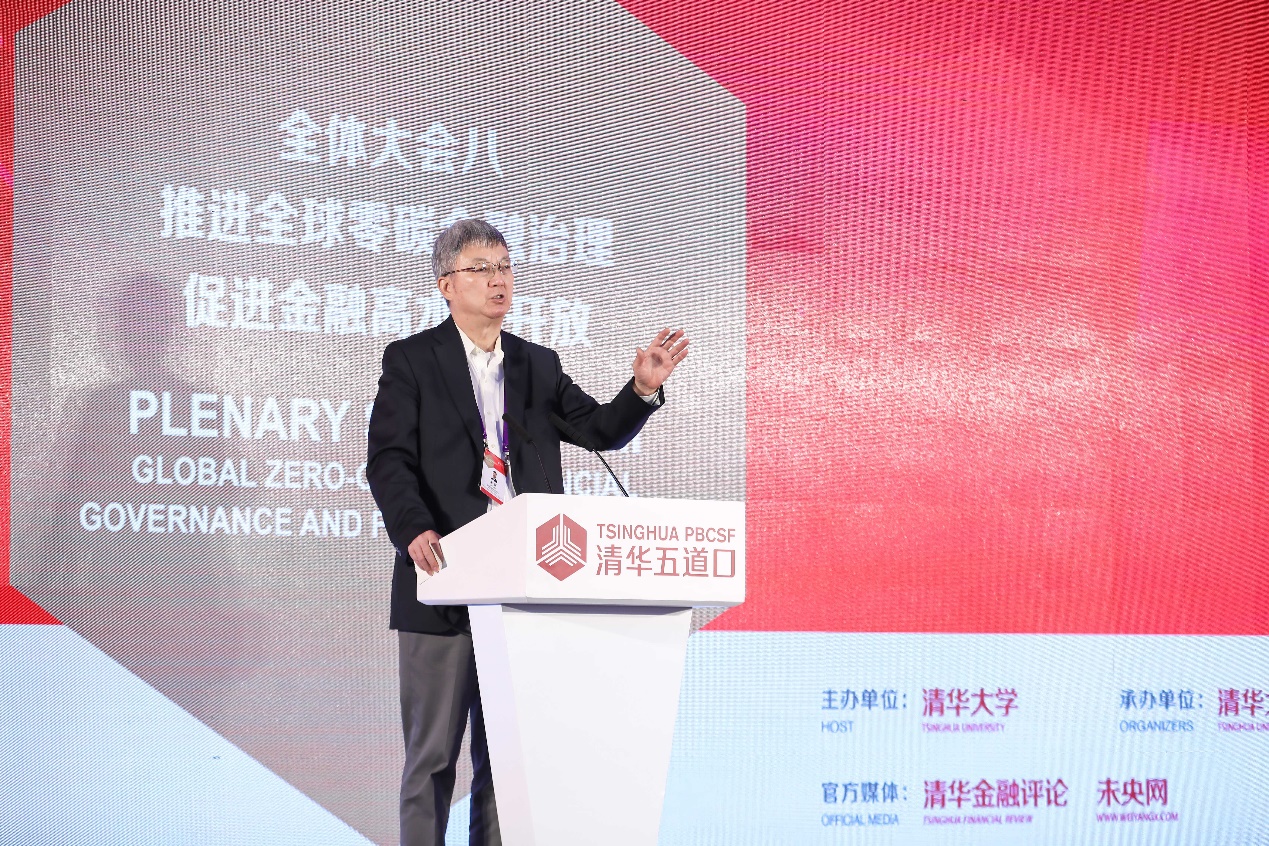
Zhu Min
In the opening speech, Zhu Min, former Vice President of the International Monetary Fund and former Vice President of the People's Bank of China, elaborated on the theme of zero carbon finance from three aspects.
First of all, zero carbon finance is a financial concept corresponding to the transition to carbon neutrality. After the Glasgow Conference, an international consensus was formed, marking the era of zero carbon finance in the financial field. Zero carbon finance has rich connotation, breadth and depth, covering environmental finance, climate change finance, sustainable finance, green finance and transformation finance horizontally, providing carbon neutrality services for the real economy vertically, and corresponding to clear assets, so it can be measured and identified. The primary tasks of zero carbon finance include financing carbon neutrality of the financial industry, revaluing existing financial assets, and realizing the zero carbon transformation of the financial industry itself.
Secondly, global finance requires the rapid development of global zero carbon financial cooperation and competition. The first is to form a globally unified sustainable financial disclosure system and establish standards in various regions and countries. The second is to establish a zero carbon financial market and fill the funding gap. For example, the cutting-edge discussion is that REITs have the characteristics of both bond nature and long-term equity returns, and can better meet the financing needs of carbon neutrality. In addition, the core driving force of carbon neutrality comes from scientific and technological innovation. The future technology market will be huge and become the commanding heights of development. Therefore, the source, market development direction, and standard formulation of technological innovation investment will also be important areas for global zero carbon finance competition and cooperation.
Finally, China should continue to actively participate in the construction of global governance mechanisms, which is the core of global zero carbon financial competition and cooperation. Currently, the global zero carbon financial governance mechanism has a dual nature of top-down and co-negotiation, requiring global convergence and mutual coordination. In order to seize this rare historical opportunity, China should play an active role in the process of building a global zero carbon financial governance mechanism and a zero carbon financial ecological market. More importantly, in the process of participating in the international governance of zero carbon finance, China should bring new experience to the "the Belt and Road" and developing countries, to help developing countries enter into zero carbon finance.
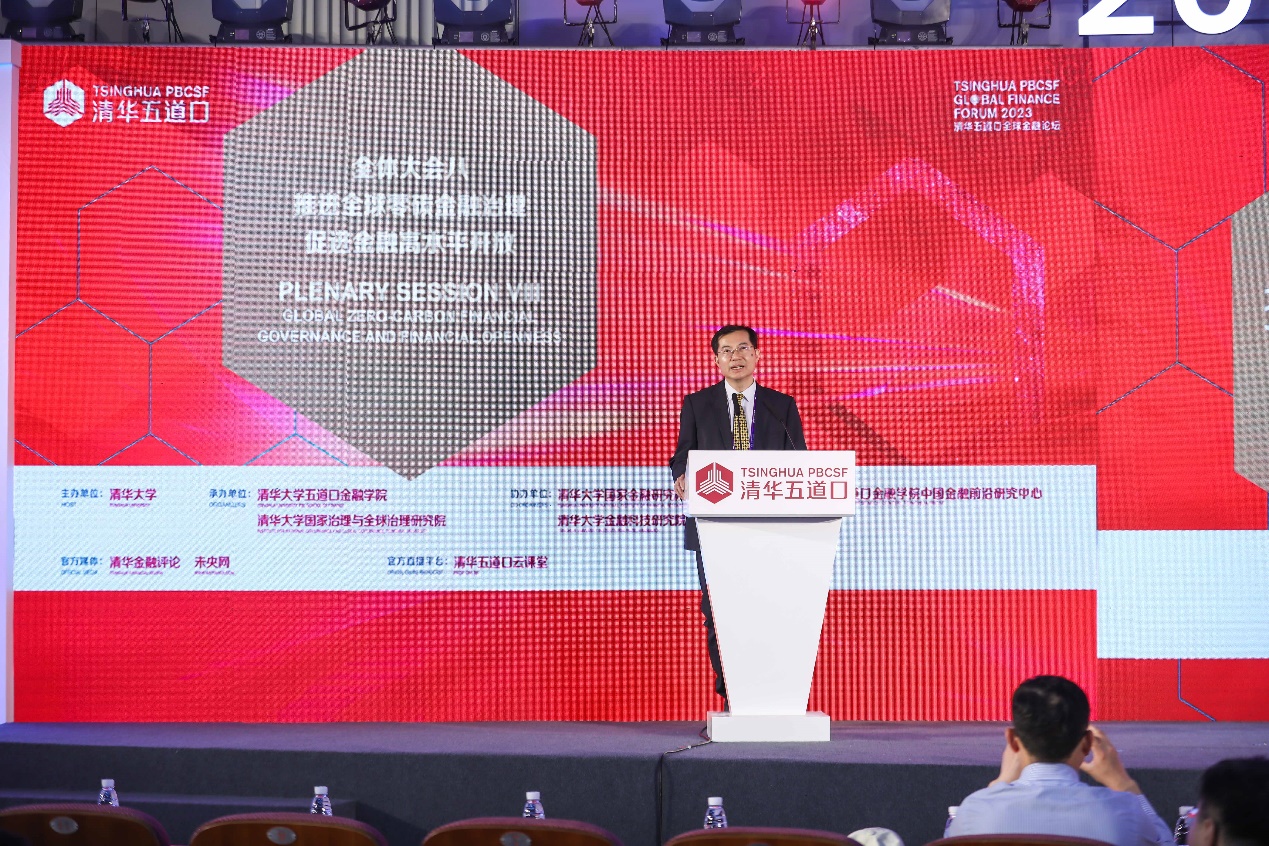
Keynote speaker Wang Xin
Wang Xin, Director of the Research Bureau of the People's Bank of China, believes that "net zero financing" is the concept most consistent with the carbon peak and carbon neutrality goal. He drew on the experience of the G20 Sustainable Finance Working Group and put forward four views: 1. the development of sustainable finance in China and international cooperation complement each other, forming a virtuous cycle; 2. the central government and relevant departments attach great importance to green finance and promote China's full participation in green and sustainable finance. Third, the establishment of a green finance system, the development of green finance products, and the mitigation of related risks play a vital role in improving the participation of financial institutions and enterprises in international green finance and sustainable financial cooperation. Fourth, the green finance reform and innovation pilot zone was established in 2017, providing valuable experience in green information disclosure, green product development and relevant standard formulation, which is a positive attempt.
Wang Xin also introduced the progress of the People's Bank of China's participation in the G20 Sustainable Finance Working Group. As the co-chairman, the People's Bank of China has played an active leadership role within the group, achieving influential and significant results together with other members. In 2023, the focus of the Sustainable Development Working Group will include timely and sufficient climate financing, financial support for non-climate sustainable development, as well as technical assistance and capacity building. The relevant efforts of the People's Bank of China in the field of sustainable finance include strengthening the construction of sustainable finance standards and frameworks, strengthening climate and environmental information disclosure, expanding the use of sustainable financial tools, and strengthening incentive mechanisms and capacity building.
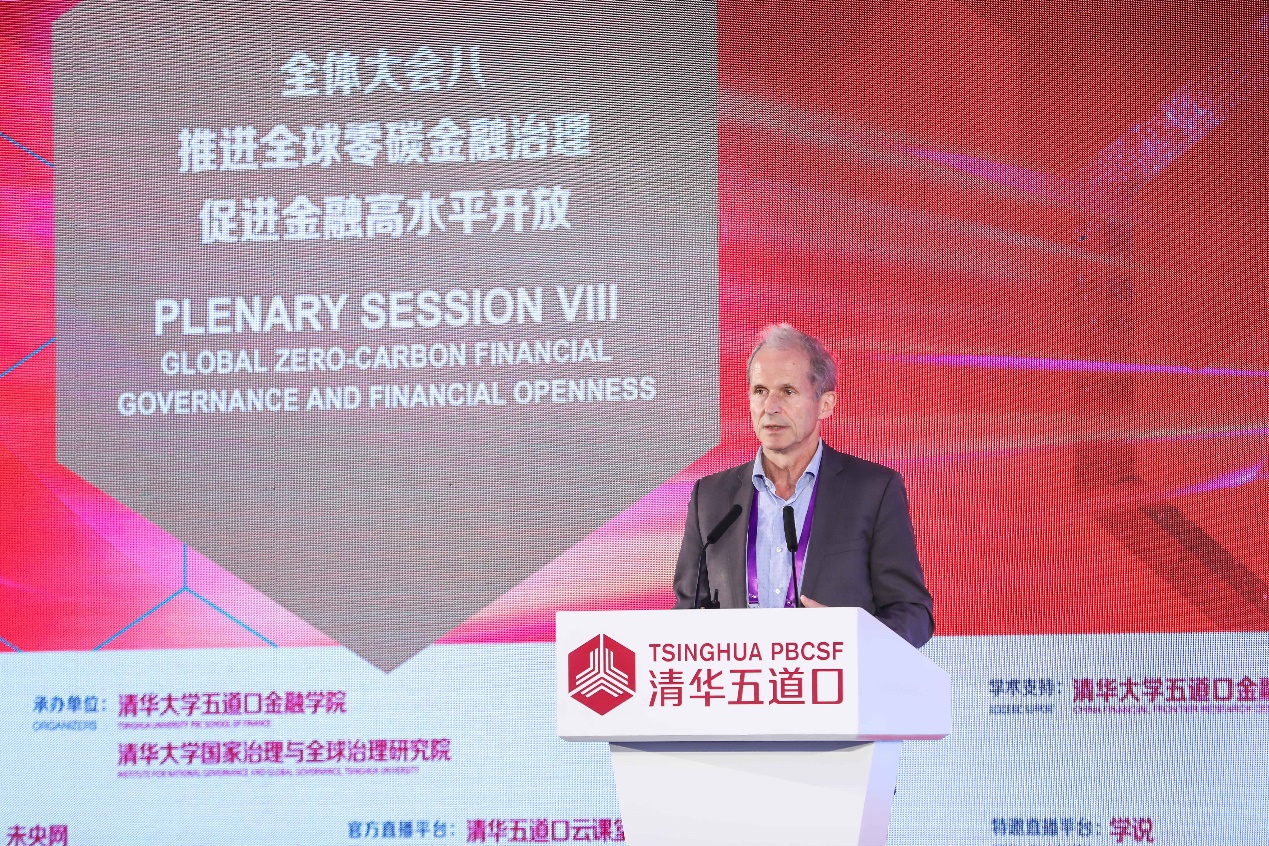
Keynote speaker Erik Berglof
Erik Berglof, Chief Economist of the Asian Infrastructure Investment Bank (AIIB), emphasizes the importance of international coordination and cooperation to fulfill neutral carbon target, and outlines a framework for global climate governance from the perspectives of carbon pricing, national platforms, financial governance, and global value chains.
Regarding international collaboration, the chief economist believes that without international coordination and cooperation, economies will face significant disruptive transitions. It is not easy to coordinate policies and actions among countries, and the Paris Climate Agreement, COP26, COP27, and other related resolutions are insufficient to achieve the goals set in the Paris Agreement. He argues that greater pressure and peer supervision need to be exerted among countries.
In terms of carbon pricing, Erik believes that a carbon market needs to be established and carbon taxes should be implemented. Carbon pricing tools can be used to influence consumption patterns and provide incentives for green technological innovation. Regarding China, he states that the construction of a carbon market will make China being one of the major beneficiaries, and import quotas can help facilitate a smoother transition for China.
Referring to national platforms, Erik introduces the example of Egypt's national platform (Nexus of Water,Food and Energy Program, NWFE), which incorporates long-term plans for renewable energy and phasing out fossil fuels. This platform is beneficial for countries and multilateral international organizations engaging in investment and financing cooperation. He mentioned that maintaining transparency in national platforms is very important for attracting investments from foreign companies.
From Erik’s point view of financial governance, a set of governance mechanism is needed to achieve a fair, just and effective transformation. It is necessary to strengthen the coordination of financial standards among countries and promote the formation and implementation of standards through investment. He also suggests that voluntary-based financial governance mechanisms should shift towards mandatory-based mechanisms.
At last, Mr. Berglof discusses de-carbonization in the global value chain. He proposes to establish standards along the value chain, while maintaining sufficient transparency and having a carbon price mechanism. Under the leadership of leading enterprises, it encourages upstream and downstream industries to carry out carbon-neutral investment and actions. He also suggests that countries should attract top enterprises’ investment and deployment to support local zero carbon transformation.
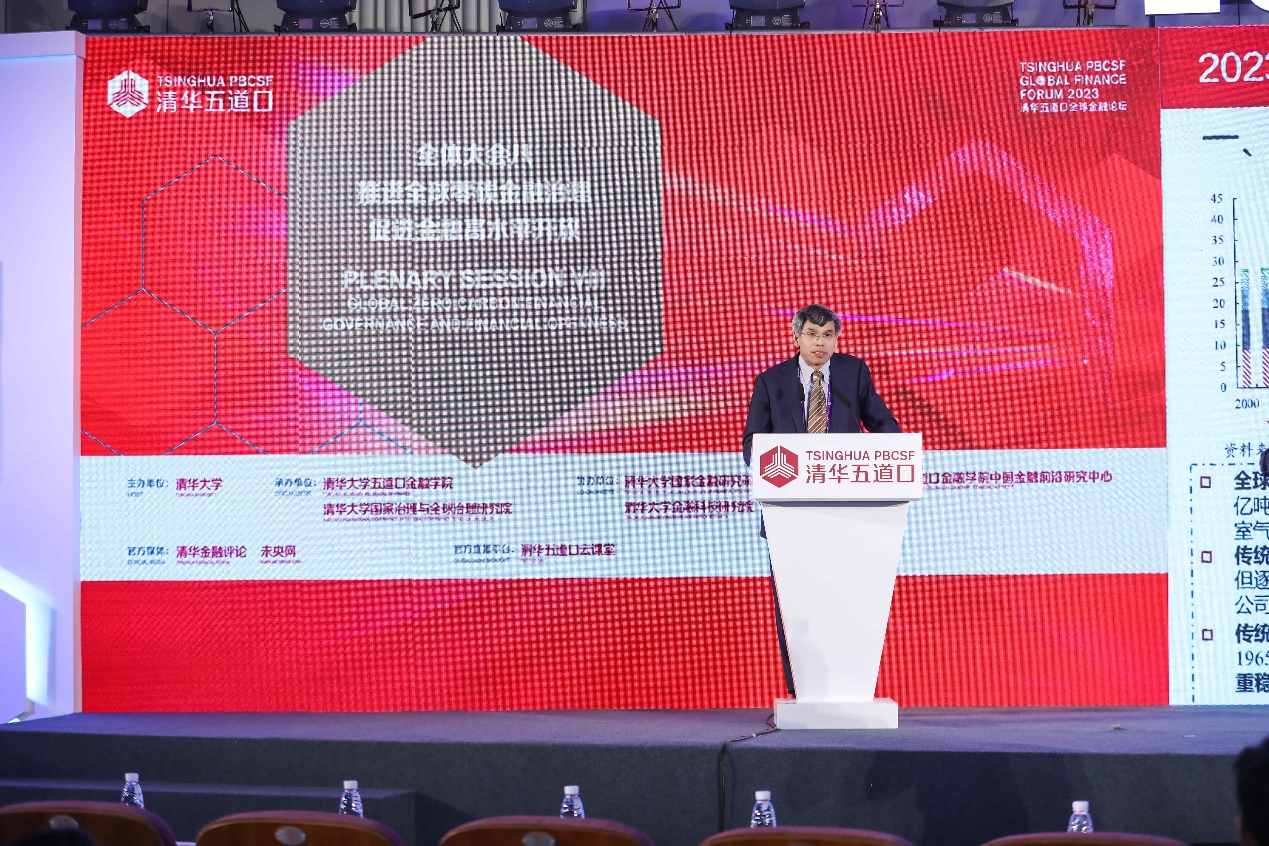
Keynote speaker Chen Weidong
Chen Weidong, Director of the Bank of China Research Institute, expressed his views on the impact of energy transformation on the global financial market structure. The influencing factors can be summarized into six aspects: 1. there will be changes in the global energy consumption structure, and the role of traditional energy will decline; 2. the global energy transformation process is accelerating, and the focus of consumption is shifting to the Asia Pacific region. Third, the changes in the international oil and gas supply and demand structure have reshaped the global energy geopolitical landscape; 4. renewable energy in the Asia Pacific region has performed well and has become a core force in global energy transformation. Fifth, high energy prices and slow economic recovery have hindered the global energy transformation. Sixth, the energy transformation affects the pricing power of global energy related products.
According to the above analysis, the green transformation of energy will have an impact on the global financial market pattern in the following eight aspects: 1. compared to traditional energy, the main driving force of new energy has shifted more towards the demand side; 2. the driving force of new energy is more balanced, and technology has become a key factor in its development and utilization; 3. the acceleration of global energy transformation under geopolitical conditions has further weakened the position of the US dollar; 4. the energy transformation has forced the Middle East to establish a new development model, shifting from capital outflows to inflows. Under the traditional energy model, Middle Eastern countries only account for 0.49% of global investment in renewable energy; 5. technological dependence in the development of new energy has become a driving force in the global private capital market; 6. the carbon market has become an active force in the financial market and an important factor in global financial governance rules; 7. the imbalance between supply and demand in the energy market and price fluctuations will increase the risk of global financial markets; 8. around 2050 will be an important time node determining the global pattern of the international monetary system.
Finally, he emphasized that the green transformation of energy will be an important force that will affect global economic development and global financial landscape in the next 30 years, which is worth full study.
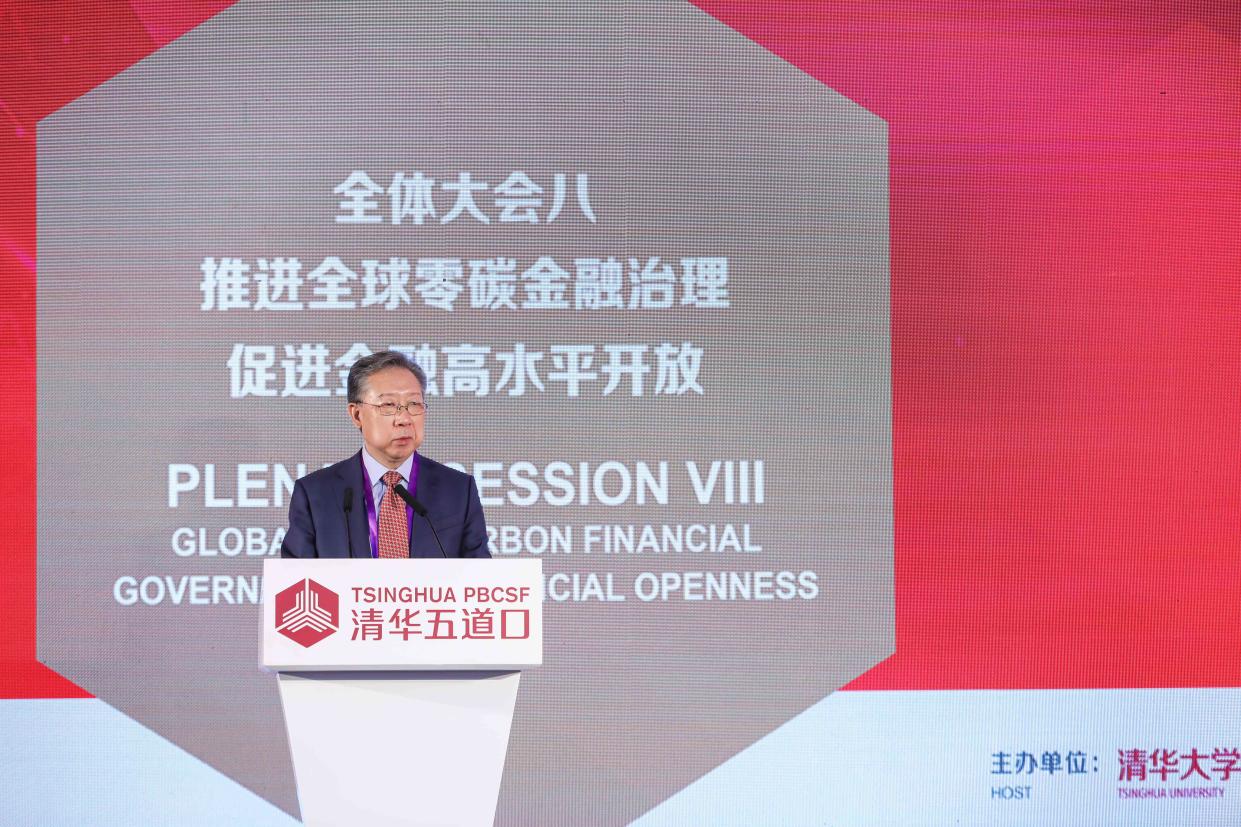
Zhang Liqing
Zhang Liqing, Director of the International Finance Research Center at Central University of Finance and Economics, delivered a speech titled "The Significance and Challenges of Expanding Financial Openness in China", pointing out that China's financial openness has steadily improved and successes in many aspects.
Subsequently, he addressed the importance of expanding financial openness from 5 aspects: 1. promote the prosperity and development of China's market economy system. It can encourage financial institutions to provide higher quality services and encourage domestic enterprises to enhance their innovation and development capabilities in international and domestic competition; 2. accelerate China's integration with international economic, trade, and financial service rules, improve the business and investment environment, and enhance investor confidence; 3. encourage more foreign capital inflows by expanding financial openness to offset the current account deficit and promote the secular equilibrium of China's external economy; 4. promote internationalization of RMB. Whether the RMB can become a "tool currency" will depend on whether China can provide a developed and open RMB asset market; 5. it helps companies and individuals diversify their investments and risk management in the international market to better control risks.
Finally, Zhang Liqing focused on two major challenges facing the current expansion of financial openness: 1. the Chinese economy may face relatively more external shocks. International capital flows may fluctuate rapidly due to fluctuations in international economic growth, changes in monetary policies of major developed countries, and some international emergencies. This may lead to fluctuations in domestic asset prices and exchange rates; 2. the impact of geopolitical conflicts and the intensification of Sino-US relations.